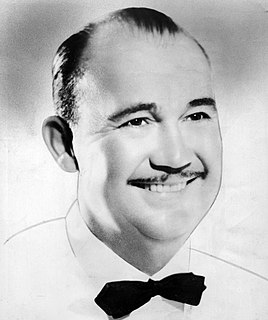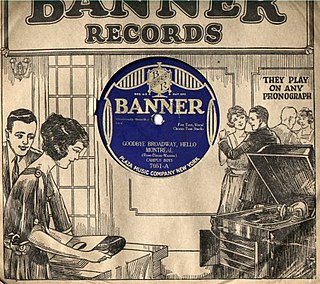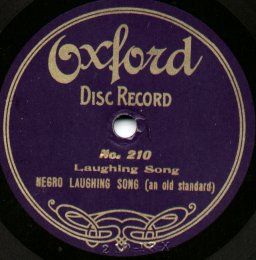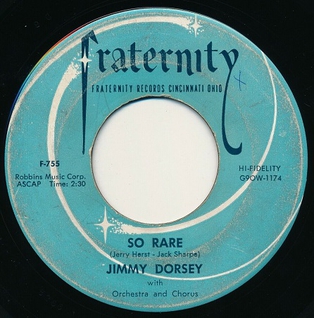
Paul Samuel Whiteman was an American bandleader, composer, orchestral director, and violinist.
Swing music is a style of jazz that developed in the United States during the late 1920s and early 1930s. It became nationally popular from the mid-1930s. The name derived from its emphasis of the off-beat, or nominally weaker beat. Swing bands usually featured soloists who would improvise on the melody over the arrangement. The danceable swing style of big bands and bandleaders such as Benny Goodman was the dominant form of American popular music from 1935 to 1946, known as the swing era. The verb "to swing" is also used as a term of praise for playing that has a strong groove or drive. Musicians of the swing era include Duke Ellington, Benny Goodman, Count Basie, Cab Calloway, Jimmy Dorsey, Tommy Dorsey, Woody Herman, Harry James, Lionel Hampton, Glenn Miller, Artie Shaw and Django Reinhardt.

Sears, Roebuck and Co., commonly known as Sears, is an American chain of department stores founded in 1892 by Richard Warren Sears and Alvah Curtis Roebuck and reincorporated in 1906 by Richard Sears and Julius Rosenwald. What began as a mail ordering catalog company migrated to opening retail locations in 1925, the first in Chicago, Illinois. In 2005, the company was bought by the management of the American big box discount chain Kmart, which upon completion of the merger, formed Sears Holdings. Through the 1980s, Sears was the largest retailer in the United States. In 2018, it was the 31st-largest. After several years of declining sales, Sears's parent company filed for Chapter 11 bankruptcy on October 15, 2018. It announced on January 16, 2019, that it had won its bankruptcy auction, and that a reduced number of 425 stores would remain open, including 223 Sears stores.

Banner Records was an American record company and label in the 1920s and 1930s. It was created primarily for the S.S. Kresge Company, though it was employed as a budget label in other discount stores.

Sears Canada Inc. was a publicly-traded Canadian company affiliated with the American-based Sears department store chain. In operation from 1952 until January 14, 2018, and headquartered in Toronto, Ontario, the company began as Simpsons-Sears—a joint venture between the Canadian Simpsons department store chain and the American Sears chain—which operated a national mail order business and co-branded Simpsons-Sears stores modelled after those of Sears in the U.S. After the Hudson's Bay Company purchased Simpsons in 1978, the joint venture was dismantled and Hudson's Bay sold its shares in the joint venture to Sears; with Sears now fully owning the company, it was renamed Sears Canada Inc. in 1984. In 1999, Sears Canada acquired the remaining assets and locations of the historic Canadian chain Eaton's. From 2014, Sears Holdings owned a 10% share in the company. ESL Investments was the largest shareholder of Sears Canada.

Oxford Records was a record label active in the United States of America from roughly 1906 until 1916. The label was produced for Sears by several labels, including Columbia and Albany Indestructible Cylinders for cylinders and Leeds & Catlin, Zon-O-Phone, and Columbia for discs. No recording activity was undertaken by Sears. All discs were single-sided.

Diva Records was an American record label from 1925 to 1932 that sold records through W. T. Grant retail stores. It was a division of Columbia Records.

Oriole Records was an American record label founded in 1921 by McCrory's stores.

Supertone Records was an American record label in the 1920s. Supertone Records were marketed by Sears, Roebuck & Co. in 1924 and again in 1929–1931. Supertone was one of several record disc brand names marketed by Sears. Supertone records were initially made by the Fletcher Record Company in 1924. The discs produced by Fletcher included midwestern dance bands. When Fletcher failed in mid–1924, Bridgeport Die & Machine Company began producing Supertone discs in late 1924.

Ben Pollack was an American drummer and bandleader from the mid-1920s through the swing era. His eye for talent led him to employ musicians such as Benny Goodman, Jack Teagarden, Glenn Miller, Jimmy McPartland, and Harry James. This ability earned him the nickname the "Father of Swing".

Adrian Francis Rollini was an American jazz multi-instrumentalist who played the bass saxophone, piano, vibraphone, and many other instruments. Rollini is also known for introducing the goofus in jazz music. As leader, his major recordings included "You've Got Everything" (1933), "Savage Serenade" (1933) and "Got The Jitters" (1934) on Banner, Perfect, Melotone, Romeo, Oriole, "A Thousand Good Nights" (1934) on Vocalion, "Davenport Blues" (1934) on Decca, "Nothing But Notes", "Tap Room Swing", "Jitters", "Riverboat Shuffle" (1934) on Decca, and "Small Fry" (1938) on Columbia.
Irving Harold Mills was an American music publisher, musician, lyricist, and jazz artist promoter. He sometimes used the pseudonyms Goody Goodwin and Joe Primrose.

Silvertone Records was a record label manufactured for Sears, Roebuck and Co. for sale in their chain of department stores and through mail order.

Challenge Records was a record label sold by the Sears-Roebuck Company. Releases were drawn from other recordings on other labels in the late 1920s, such as Banner, Gennett, Paramount Records and others. Sears also had the Silvertone label and the same recording of "Black Bottom" by Joe Candullo & his Everglades Orchestra was released on both labels. Around 1929 Sears did away with Challenge and Silvertone, replacing them with Conqueror Records. Challenge discs generally sold for less than Silvertone ones because they seldom used songs requiring royalty payments and the label generally assigned pseudonyms to the artists. Introduced in the Spring 1927 catalog for just 24¢ per disc, Challenge bore the frank disclaimer, "If you want the best, we recommend the Silvertone." The last issues appeared in Sears’ Spring 1931 catalog.
Territory bands were dance bands that crisscrossed specific regions of the United States from the 1920s through the 1960s. Beginning in the 1920s, the bands typically had 8 to 12 musicians. These bands typically played one-nighters, six or seven nights a week at venues like VFW halls, Elks Lodges, Lions Clubs, hotel ballrooms, and the like. Francis Davis, jazz critic for The Village Voice, likened territory bands to "the Top 40 cover bands of their day, typically relying on stock arrangements of other ensembles' hits." He said, "many historians give much credit to territory bands for popularizing modern ballroom dancing that began during the World War I era with the influence of Vernon and Irene Castle."

Bert Lown was a violinist, orchestra leader, and songwriter.

"So Rare" is a popular song published in 1937 by composer Jerry Herst and lyricist Jack Sharpe. It became a hit for Jimmy Dorsey in 1957.

James Louis Chirillo is an American jazz guitarist, banjoist, composer, arranger, and band leader.
John Marcus Lathrop was an American vocalist and guitarist with the Tune Twisters, Glenn Miller, and Hal McIntyre. Beginning around 1947, Lathrop was leader of the Drug Store Cowboys.
The Tune Twisters was an American jazz vocal trio founded in 1934 as The Freshmen by Andy Love, Robert "Bob" Wacker, and Jack Lathrop, who also played guitar. They were featured on radio broadcasts and recorded with jazz artists that included (i) Ray Noble in 1935, (ii) Bob Crosby in 1935, (iii) Glenn Miller in 1937, and (iv) Adrian Rollini in 1938. The Tune Twisters performed in the 1937 Broadway production, Between the Devil, singing "Triplets." The production ran from December 22, 1937, to March 12, 1938. During the audition, the Tune Twisters were known as the Savoy Club Boys. Lathrop was a member of the Tune Twisters in 1939 when they recorded the first radio jingle of its kind for Pepsi – "Pepsi-Cola Hits the Spot" (aka "Nickel, Nickel"). The trio also performed in two 1935 films, Sweet Surrender and Melody Magic, the latter directed by Fred Waller. Gene Lantham, in 1940, replaced Lathrop, who went on to become guitarist and vocalist with Glenn Miller.
















